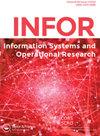时间聚合和旅行时间模型对时变路由解决方案的影响
IF 1.6
4区 计算机科学
Q4 COMPUTER SCIENCE, INFORMATION SYSTEMS
引用次数: 1
摘要
本文章由计算机程序翻译,如有差异,请以英文原文为准。
The impact of time aggregation and travel time models on time-dependent routing solutions
Abstract Traffic and congestion have a big impact on the performance of transportation systems. Travel time models are required to calculate trip durations and arrival times when traffic information is available. These models rely on the availability of detailed information about the traffic state. With the growing availability of onboard devices, we can now capture very precise data with a very high frequency. The challenge is now to efficiently use these data to solve routing problems and evaluate routing solutions. A key question that emerges is how to determine the best compromise between a huge amount of very precise data and a smaller volume of aggregated data. In this article, we analyze the impact of time aggregation on the performance of the main travel time models, namely the link travel model (LTM), the flow speed model (FSM) and the smoothed travel time model (STTM). We also analyze the impact of different time aggregation levels on these models. Our results show that all models share similar performance, particularly with large intervals. Finally, we show that the LTM largely respects the FIFO property, which is an important hypothesis for routing algorithms.
求助全文
通过发布文献求助,成功后即可免费获取论文全文。
去求助
来源期刊

Infor
管理科学-计算机:信息系统
CiteScore
2.60
自引率
7.70%
发文量
16
审稿时长
>12 weeks
期刊介绍:
INFOR: Information Systems and Operational Research is published and sponsored by the Canadian Operational Research Society. It provides its readers with papers on a powerful combination of subjects: Information Systems and Operational Research. The importance of combining IS and OR in one journal is that both aim to expand quantitative scientific approaches to management. With this integration, the theory, methodology, and practice of OR and IS are thoroughly examined. INFOR is available in print and online.
 求助内容:
求助内容: 应助结果提醒方式:
应助结果提醒方式:


